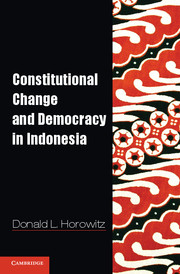Book contents
- Frontmatter
- Contents
- Preface
- Map of Indonesia
- Glossary
- 1 A Distinctive Path
- 2 Democratization Before Renovation
- 3 Creeping Reform
- 4 A Game of Inches
- 5 Anomalies, Ironies, Regularities, and Surprises
- 6 The Shape of the New System
- 7 Low-Quality Democracy and Its Discontents
- 8 Causes, Consequences, and the Consequences of the Consequences
- Index
- References
1 - A Distinctive Path
Published online by Cambridge University Press: 05 February 2013
- Frontmatter
- Contents
- Preface
- Map of Indonesia
- Glossary
- 1 A Distinctive Path
- 2 Democratization Before Renovation
- 3 Creeping Reform
- 4 A Game of Inches
- 5 Anomalies, Ironies, Regularities, and Surprises
- 6 The Shape of the New System
- 7 Low-Quality Democracy and Its Discontents
- 8 Causes, Consequences, and the Consequences of the Consequences
- Index
- References
Summary
The unanticipated fall of Suharto in May 1998 left standing a disparate cast of political leaders, who eventually settled upon an unusual strategy of democratic reform. The path they chose had three main characteristics.
First, it was insider dominated. An important role was played by leaders active in the former authoritarian regime who were now operating in a genuinely competitive environment. Those leaders and the former opposition leaders who joined them in the legislature after elections pursued radical constitutional change intramurally, without resort to a constitutional commission or a convention and with relatively little consultation with civil society bodies or the public at large. The revised constitution was unequivocally the politicians’ product. It was not subject to any outside approval process. It was an inside job.
Second, the sequence of reform put elections before constitutional change. Given Indonesia’s authoritarian history, legitimation at the polls might have been seen as empowering newly elected legislators and allowing them to stop short of developing a fully liberal democracy, but putting elections first actually had a different effect; it opened up a competitive process that carried even the most reluctant democratizers along and conferred sufficient authority on the legislators to pursue a full course of reform, which is what they did.
- Type
- Chapter
- Information
- Constitutional Change and Democracy in Indonesia , pp. 1 - 29Publisher: Cambridge University PressPrint publication year: 2013

